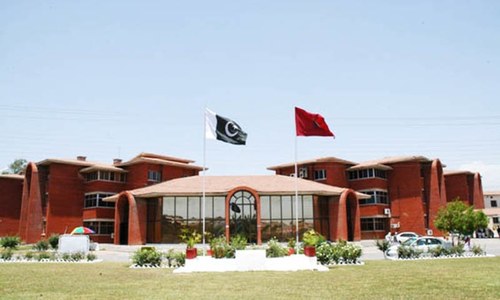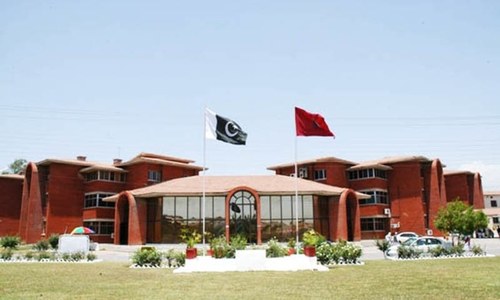The Punjab government on Sunday banned for two weeks the sale and usage of a locally manufactured injection, allegedly responsible for causing loss of vision in several patients in the province, until quality check results were obtained.
On Saturday, the Punjab government formed a five-member committee to probe the loss of eyesight among patients after allegedly being administered locally manufactured injection “Avastin” at different hospitals in the province.
The committee will be led by King Edward Medical University Dr Asad Aslam Khan as convener. Other members include Director General Drugs Control Muhammad Sohail, Mayo Hospital’s Dr Muhammad Moin, Lahore General Hospital’s Dr Tayyaba and Services Hospital’s Prof Dr Mohsin.
According to reports, diabetic patients in Lahore, Kasur, and Jhang districts were administered Avastin injections to address retinal damage. However, these injections led to severe infections, ultimately resulting in the loss of eyesight of approximately 12 patients, including the brother of senior PPP leader Chaudhry Manzoor and his friend.
Taking to social media platform X (formerly Twitter) today, Punjab caretaker Chief Minister Mohsin Naqvi said a crucial meeting was held with the health department and doctors to address the Avastin-related blindness cases and an action plan for devised.
As per the plan, “immediate strict action” would be taken against drug inspectors responsible for the availability of non-sterile injections with a pending inquiry.
Naqvi said the government of Punjab would provide free treatment to all the patients and a high-powered inquiry team had been formed for swift investigation.
“The police have been instructed to ensure the arrests of those responsible,” the CM added.
Injection recalled from market
Earlier in the day, caretaker Health Minister Dr Nadeem Jan said the injection had been recalled from the market while a case been registered against the suppliers.
Speaking to the media in Islamabad alongside Punjab Minister for Primary and Secondary Healthcare Dr Jamal Nasir, the minister said that reports regarding the injections had been received from Multan, Kasur, Lahore and Sadiqabad.

“Dr sahib informed us that the investigation is ongoing,” he said, adding that a five-member committee had also been formed which would submit a report in three days.
Jan said that the injection in question had been recalled from the market, and selling it was no longer permitted. “The supplier [of the injections], two men, a first information report (FIR) has been registered against them and a legal inquiry has been initiated.”
He reiterated that the injection had been recalled from the market, assuring the nation that the matter would be investigated in a transparent manner and the findings would be placed before the people.
He further said that the government would also go after those responsible while also cooperating with those that had been affected and providing them with the necessary medical attention.
Meanwhile, Nasir said that the a large margin of profit was being earned through the injection. He said that the injection came in a dose of 100mg, and was manufactured by a multinational pharmaceutical and distributed by a well-reputed institution.
“The dose is 100mg. But it is divided for the eyes because only a 1.2mg dose is required,” the provincial minister said. He said that the entire batch had been removed from the market by the Drug Regulatory Authority of Pakistan (Drap), while instructions had been issued that that it would not be sold until the reports weren’t “clear”.
“At the same time, we asked our inspectors to seize it from the markets,” Nasir said. He further said that a FIR had been registered against two men, Naveed and Hafiz Bilal, and raids were under way to apprehend them.
He said that the incident was not limited to Lahore and Kasur, adding that reports were also received from Multan and Sadiqabad. He said that the committee formed by the Punjab government was investigating whether this was a sterilisation issue or if there was an issue with the entire batch.
He said that authorities were also looking at the licence for importing the injection, the distribution process and if the doctors who administered the injections were qualified.
“So when the investigation will be completed and the report will come forward, then we will be in a position to give a final comment. It seems there are between 14 to 20 patients,” Nasir said.
However, the provincial minister refrained from giving a concrete figure, saying that authorities had to go and interview each patient individually.
Doctors weigh in
Dr Asim Gill, who administered the injections at Sharif Hospital, stated that Avastin is exclusively used to restore vision damaged by diabetes. Normally, three to four injections were administered to a patient, but in this case, several individuals lost their eyesight.
Dr Gill mentioned that three of the affected patients underwent surgery and regained their vision.
Mayo Hospital head surgeon Prof Asad Islam raised concerns and wrote a letter to the health department. He reported that numerous patients who received Bevacizumab injections supplied by Naveed suffered from blinding eye infections in Lahore and other parts of Punjab.
The infection was attributed to unsterilised injections, and Prof Aslam emphasised the need for serious attention to prevent such incidents in the future.
Nishtar Medical University senior registrar Dr Nausherwan Adil shed light on the sourcing of the Bevascizumab vial, stating that it was purchased from a UK-based company. Approximately 70 injections of 1.25 mg/0.5ml were prepared from each vial under specialised conditions.
He highlighted that Shaukat Khanum, Doctors’ Hospital, and Saira Memorial Hospital had the facilities to manufacture these injections within controlled environments and sensitivity reports.
He said the investigation should focus on potential sources of contamination, including inadequate sterilisation, infected vials, non-sterile syringes, and deviations from standard operating procedures in the drug dispensing process.













































